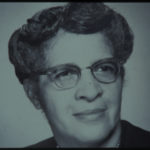Category Archives: Network News/Events
Forum to address corrupting role of money in state politics
 Money in SC Politics: a roundtable discussion
Money in SC Politics: a roundtable discussion
Feb. 6, 7-9pm
USC Law School Auditorium, 1525 Senate St., Columbia
As South Carolina reels from the growing corruption scandal in the State House, the public is invited to a timely round-table discussion about how we can reduce the influence of money in state politics and policy-making. Legislators and good-government advocates will debate ways to make state government more representative, competitive, and responsive to South Carolina citizens.
At the table: Rep. Gilda Cobb Hunter (D-Orangeburg); Sen. Mike Fanning (D-Fairfield); Rep. Gary Clary (R-Oconee); Sen. William Timmons (R-Greenville); Lynn Teague, Vice President, League of Women Voters South Carolina; and John Crangle, Government Relations Director, SC Progressive Network.
The audience will be invited to ask questions and offer comment.
Reception to follow.
Click HERE to read about a package of anti-corruption bills the Network is backing and tracking.
The free event is sponsored by the nonpartisan Education Fund of the SC Progressive Network and the American Constitution Society for Law and Policy, USC School of Law. It is listed on the House and Senate’s legislative calendar.
RSVP/Share on Facebook.
Dr. Sarah Keeling honored with USC social justice award
The SC Progressive Network applauds our membership liaison Dr. Sarah Keeling for the much-deserved recognition of her social justice work by the University of South Carolina. She was among four honored with the 2018 MLK Social Justice Award.
Sarah is a graduate of the Modjeska Simkins School for Human Rights (a Network project), and was elected to the Network’s executive committee at our fall retreat. She helped lead the recent tour of the State House monuments, featured in this Columbia’s Free Times story, and is working on expanding that project.
Read more about Sarah and her fellow honorees here.
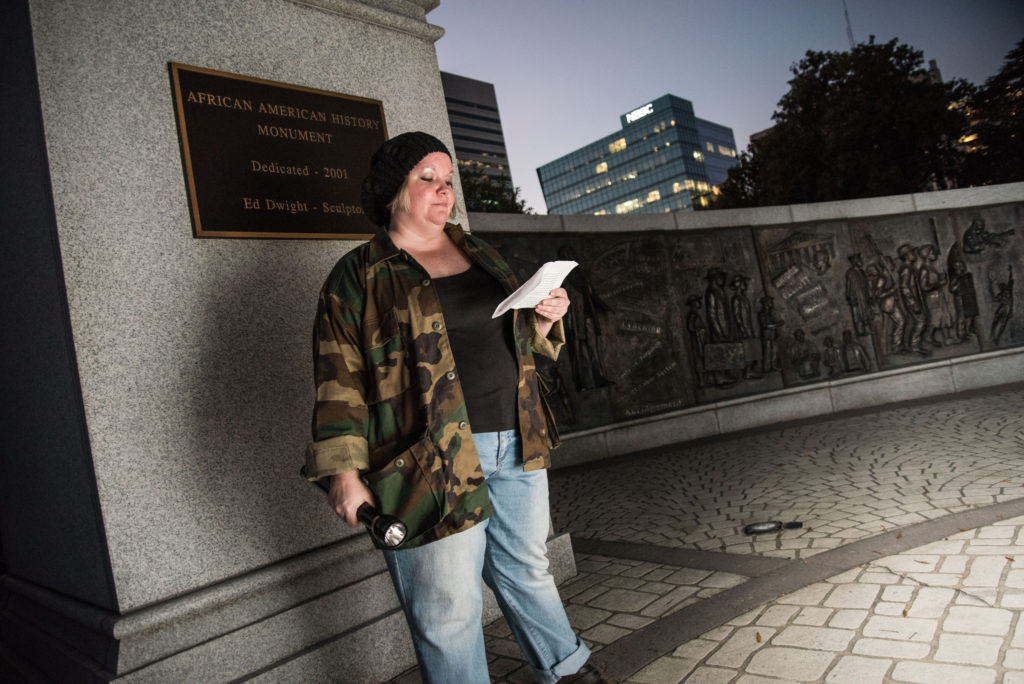 Sarah Keeling puts the African American monument into context on a recent tour reinterpreting some of the monuments on the State House grounds. See more photos of the tour in our photo album.
Sarah Keeling puts the African American monument into context on a recent tour reinterpreting some of the monuments on the State House grounds. See more photos of the tour in our photo album.
Progressive Legislative Caucus introduces anti-corruption bills
The SC Progressive Legislative Caucus has introduced four bills prepared by the SC Progressive Network’s Research and Policy Institute to reduce the corrupting influence of money in state policies.
The timing of this legislative package is critical, as South Carolina’s ethics scandals stretch into an election year. With public appetite for cleaning house at a record high, the Network is prepared to advance common-sense bills for reforms to make government more transparent and accountable.
Special election restitution
H-4502 would make politicians removed from office due to a criminal conviction pay for the special elections to replace them. Progressive Caucus member Sen. Mike Fanning (D-Fairfield) filed (S-533) bill in the Senate during the last session. (Watch a clip of him explaining the legislation.) Caucus Chair Rep. Gilda Cobb-Hunter, the bill’s primary House sponsor, says that the flood of campaign cash to legislators who face no opposition has contributed to corruption.
Each special election to replace incumbent legislators removed from office due to a conviction costs taxpayers around $120,000 for a House seat; and $180,000 for a Senate seat. The state only pays for 40% of the cost, leaving counties paying the balance out of their underfunded budgets. To replace convicted attorneys general or other constitutional officers costs about $30,000 if a special session of the legislature is called.
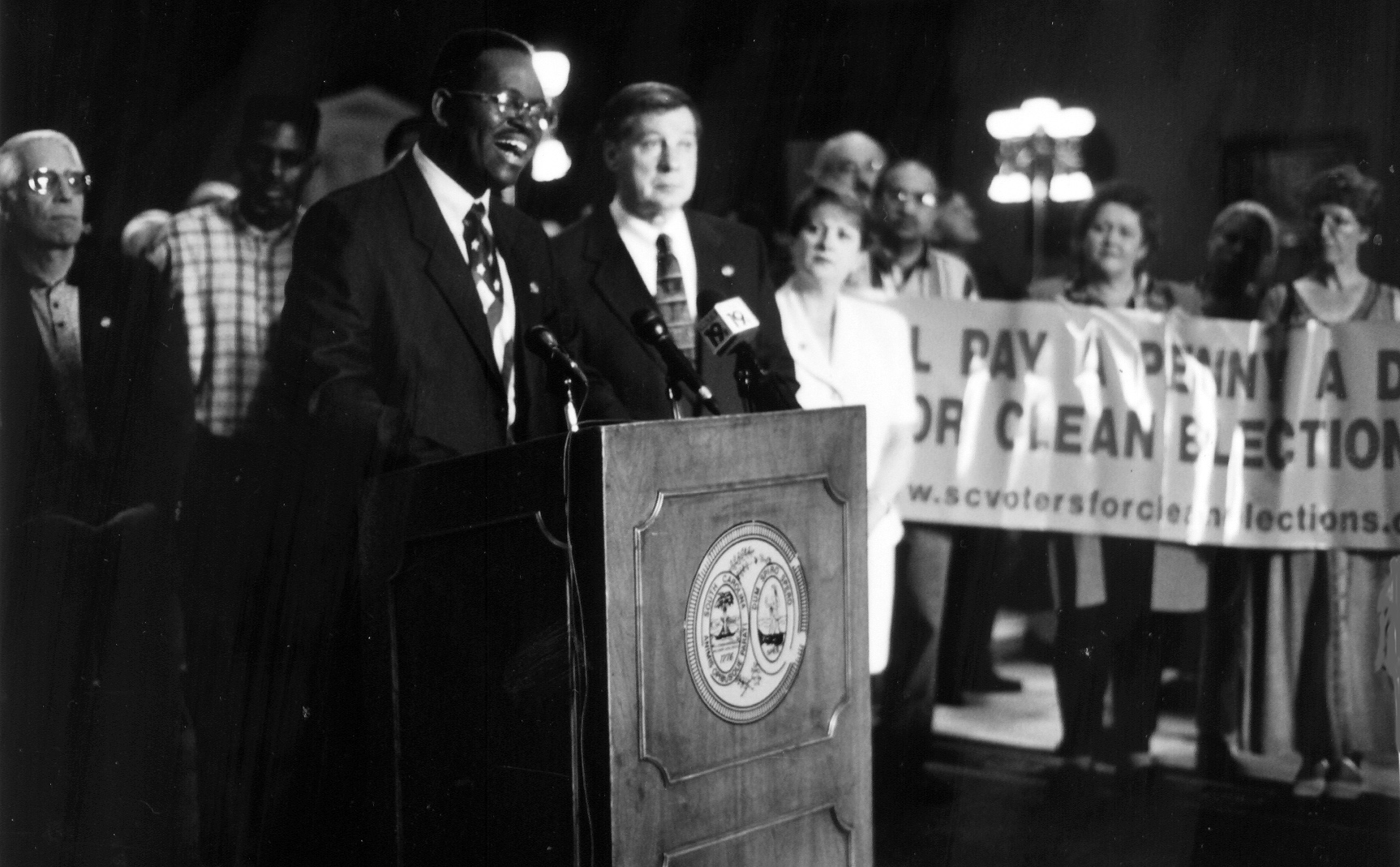 The late Sen. Clementa Pinckney speaks at a press conference to promote the Network-backed bill he sponsored for clean elections (also called publicly financed elections). While it has been introduced year after year, the provision may now get traction as a bill to allow public financing for attorney general races.
The late Sen. Clementa Pinckney speaks at a press conference to promote the Network-backed bill he sponsored for clean elections (also called publicly financed elections). While it has been introduced year after year, the provision may now get traction as a bill to allow public financing for attorney general races.
Public financing of candidates for SC attorney general
As South Carolina’s corruption scandal widens, the time is ripe to renew our call for publicly financed elections, beginning with the attorney general. H-4499 calls for giving qualified candidates for attorney general who refuse all private donations a publicly financed grant to run for office.
State Attorney General Alan Wilson took maximum campaign contributions in his last race from both the McNair firm and SCANA. He took more than $500,000 from lawyers and off-duty lobbyists in his last three campaigns. After his 2014 campaign, Wilson returned $3,500 to former House Speaker Bobby Harrell after Harrell was indicted, and Wilson had to refund about $50,000 in donations that exceeded contribution limits.
Public financing would allow candidates to run for attorney general without taking any campaign contributions from individuals or corporations that may later need to be investigated or indicted. In 2001, then Republican Party Chairman Henry McMaster understood the problems inherent in allowing the state’s top law enforcement officer to rely on private cash to run for office. McMaster told Gov. Hodge’s Campaign Finance Reform Commission that the race for attorney general is the one elected office that should be publicly financed.
Banning campaign donations by regulated utilities
4501 would prohibit regulated utilities from making campaign contributions to the candidates and politicians who are responsible for regulating them. An example is the 2007 legislation that allowed SCE&G to charge ratepayers in advance for nuclear reactors that have since been abandoned.
“The power company paid former Gov. McNair’s law firm to write the bill,” Cobb-Hunter said. Then both the utility and the law firm made $60,000 of strategic, bipartisan donations to legislators. “They even gave me a donation,” she said. The bill passed both bodies without a public hearing or debate. The Senate didn’t even take a roll call vote.
Public transparency and accounting fee for campaign donations
H-4500 would place a small fee on all campaign contributions that would fund an automated public disclosure system and generate money for attorney general candidates who want to opt into a publicly financed campaign.
The State Ethics Commission is woefully underfunded, short-staffed, and has a public disclosure web site that is opaque. Furthermore, candidates make unintentional mistakes – as well as intentional – in filing. We’ve crafted a low-cost, high-tech solution to multiple problems.
Live inspired in 2018!
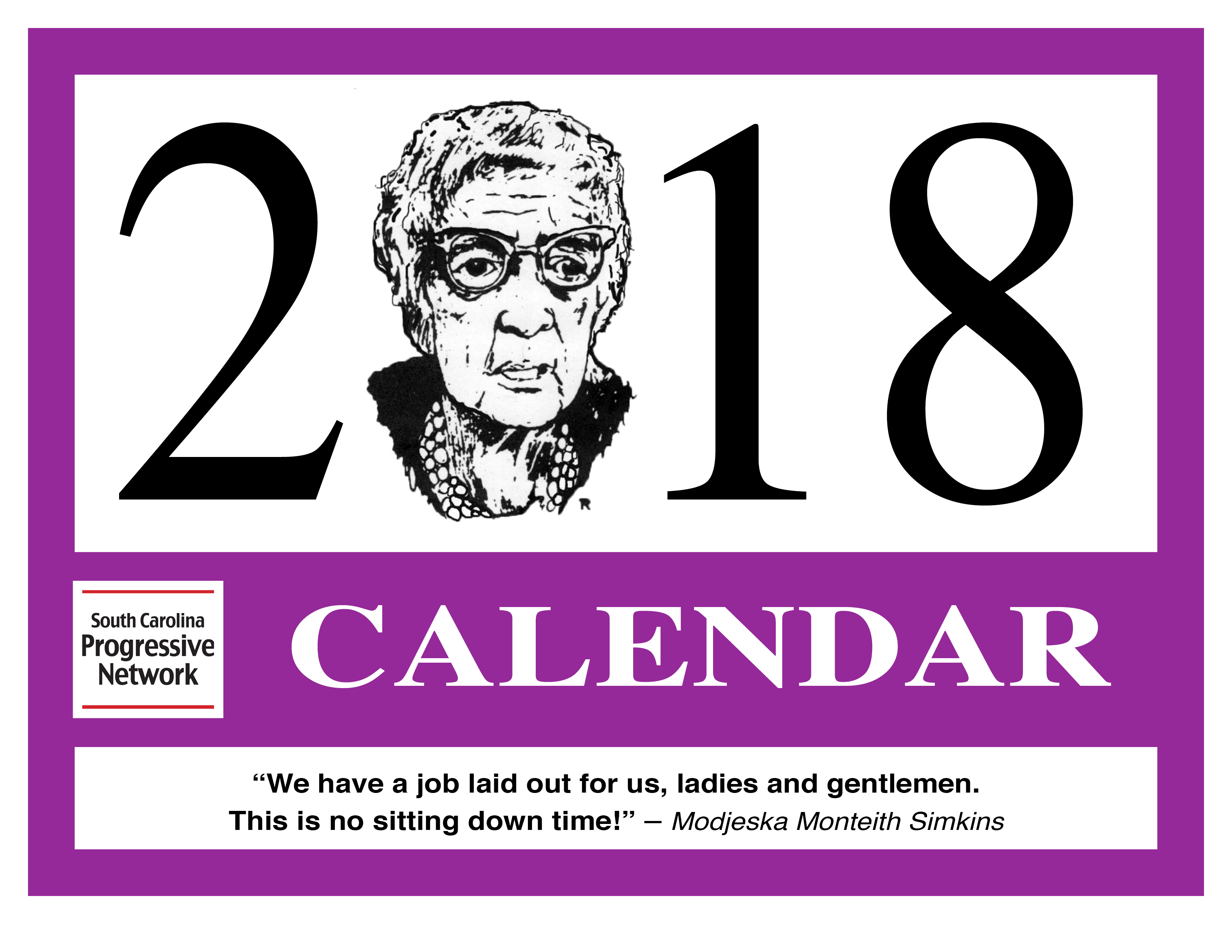 Order your calendar TODAY and be inspired all year by photographs and quotes of Modjeska Monteith Simkins.
Order your calendar TODAY and be inspired all year by photographs and quotes of Modjeska Monteith Simkins.
Proceeds will support the Modjeska Simkins School for Human Rights, a project of the SC Progressive Network. Calendars are $10 each; includes shipping. (See preview.)
Click HERE to order, or call 803-808-3384.
Bobby Donaldson: “The legacy of Modjeska Simkins is not dead”
In 1938, just days before her 39th birthday, Modjeska Simkins drew up plans for her own funeral. “For reasons known only to myself,” she wrote directives for a simple ceremony to be carried out “in the event of my demise.” It included a list of hymns and readings, and a note to the mortician to refuse floral arrangements.
We can only guess what prompted her to write the document, which USC history professor Dr. Bobby Donaldson shared at this year’s Modjeska party, an annual birthday celebration the SC Progressive Network holds at her Columbia home. He said it appears nobody ever read it, perhaps because it was buried in the piles of books and papers that filled her home.
This much is clear: there was much ado and flowers aplenty when Modjeska died in 1992. And for good reason.
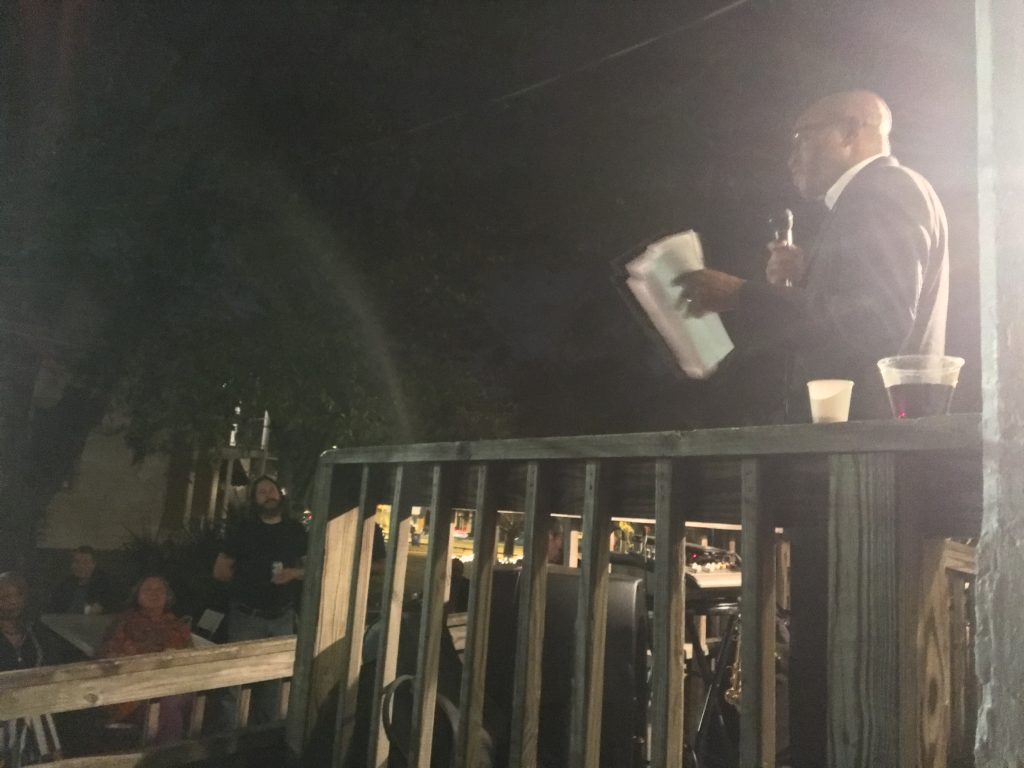 Dr. Bobby Donaldson speaks from the back porch of the Modjeska Simkins House.
Dr. Bobby Donaldson speaks from the back porch of the Modjeska Simkins House.
“Fortunately for us,” Donaldson said, “Modjeska did not die in 1938. If she had, we would not have a SC NAACP, established in 1939. If she had died, we would not have had an extraordinary letter written in 1944 to the governor, Olin D. Johnston, demanding he debate the merits of white supremacy. If she had died in 1938, we would not have the Modjeska in 1946 who helps organize one of the most extraordinary youth gatherings in the history of this country.”
He ticked off a list of things that would not exist were not for Modjeska, including the Harbison Training Institute that taught progressive activists in the late 1940s (with a curriculum mirroring that of the Modjeska Simkins School for Human Rights) and the 1951 Briggs v Elliott case, a critical component of what would become Brown v Board in 1954.
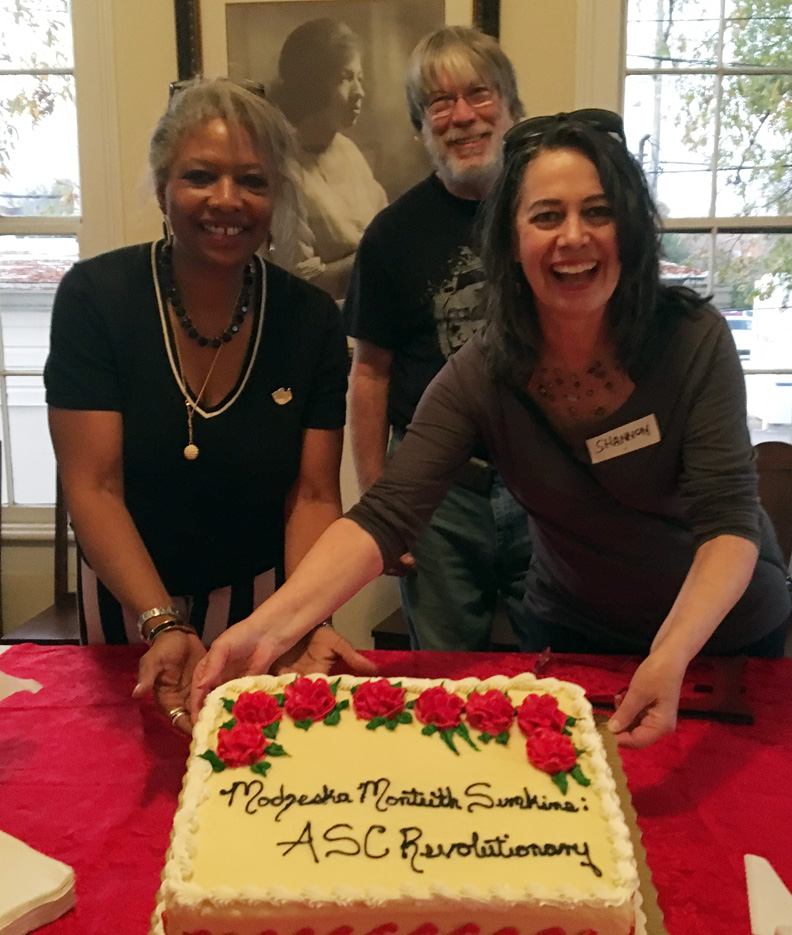 Donaldson ended with a call to action. “The legacy of Ms. Simkins is not dead,” he said. “And if we ever needed a Modjeska Simkins movement inspired by her legacy, you look around this world; we need it now.”
Donaldson ended with a call to action. “The legacy of Ms. Simkins is not dead,” he said. “And if we ever needed a Modjeska Simkins movement inspired by her legacy, you look around this world; we need it now.”
As part of the Network’s commitment to educating and mobilizing that movement, we are preparing to reprint Network Communications Director Becci Robbins’ booklet Modjeska Monteith Simkins: A South Carolina Revolutionary. It will include a new section with historical details discovered since the original printing.
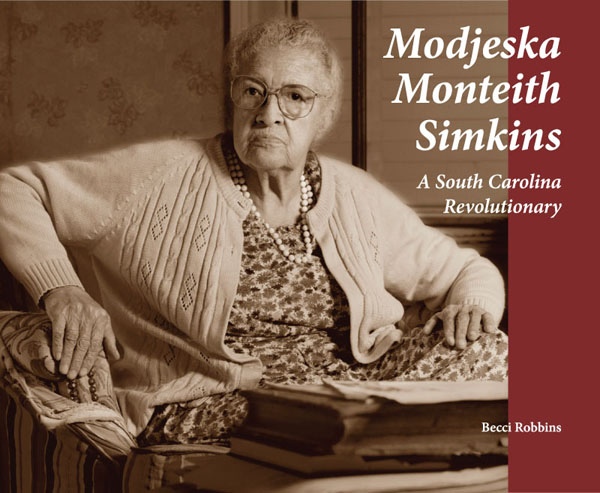 The booklet, published in 2014 through a grant from the Richland County Conservation Commission, has been circulated widely in the Midlands and at no cost to readers. We’d like to keep the booklet free. You can help make that possible.
The booklet, published in 2014 through a grant from the Richland County Conservation Commission, has been circulated widely in the Midlands and at no cost to readers. We’d like to keep the booklet free. You can help make that possible.
To date, we have received a generous donation from Historic Columbia and a number of individual supporters, raising $1,700 of the $3,900 we need.
Please help us reach our goal by donating at our secure site or by calling our office at 803-808-3384.
To view more photos from this year’s party, see our album.
Listen to Modjeska Simkins School graduate Vikki Perry in this clip.
Revolutionaries to gather at intersection of art and activism
Dream dangerously and party like a revolutionary during two days of art, culture, education, entertainment, and activism at the 2nd Subversive Art Festival Extravaganza (SAFE 2.0) on Nov. 3 and 4 in Columbia.
New Legacy Project, the youth coordinating body of SC Progressive Network, invites the public to join them for a weekend of education, arts, and culture that is intended to entertain, engage, and empower.
“SAFE 2.0 is a space to challenge the limits of what is presented as the only ‘workable’ systems of organizing our society,” said Daniel Deweese, New Legacy Project co-founder and SAFE organizer.
Festivities will kick off on Friday, Nov. 3, with a Find the Power Rally from 6pm to 8:30pm at the SC State House. The rally will begin with a guided tour of the grounds with recent graduates of the Modjeska Simkins School giving a people’s history of the monuments. It will close with a discussion on ways to build power to create positive change for the future of South Carolina. All are welcome to this free event.
On Saturday beginning at 5pm, join artists and activists for an art and culture festival at Tapp’s Art Center, 1644 Main St. There will be live music, spoken word performances, comedy, visual art, education, camaraderie, and more! Tickets for SAFE 2.0 are $7.
Connor Brunson performs at last year’s SAFE festival.
Art changes people, and people change the world. There is a long tradition of art meeting activism to create social and political change – even in South Carolina. With the recent emboldening of racist, bigoted, nationalistic, and misogynistic sentiment, it is increasingly important to present a united front against oppressive systems that silence and subjugate marginalized communities, especially when these systems are working for a miniscule percentage of Americans. Art and activism will always intersect in a way that educates and empowers people to effect change. The aim of SAFE 2.0 is to do just that.
The New Legacy Project values the collective wisdom and discipline of the progressive organizers who came before us working for radical, structural change. Our main objective is mentorship, education, and organizing young leaders who will continue building our inter-generational, multi-racial, multi-issue statewide popular movement for racial, economic and social justice and equality. To learn more about New Legacy Project and upcoming events, please see their Facebook page.
Network solidifies plans, hones strategy at fall retreat

Rep. Gilda Cobb-Hunter spent the weekend at our retreat, leading group discussions and spearheading the formation of a development committee.
The SC Progressive Network‘s annual fall retreat last weekend at beautiful Santee State Park was one of the best meetings we’ve had. Since our founding in 1996, we have been steadily building a movement for social justice, holding true to the “revolution of values” that Dr. King called for. Over the past two decades (and the years of grass roots organizing at GROW that preceded the Network) we have built and maintained a solid framework for the coalition. Now we’re putting muscle on it.
Our analysis, strategy and tactics are holding under fire and proving themselves sound. We are developing public policy, crafting and passing legislation, and winning targeted races. Our success is due to perseverance, principled work, and trust built over time. The retreat was a chance for us to take stock of where we are and to map a path forward, with immediate and longer-term plans.
One of our primary goals now is to educate allies to the reality that we cannot fix the systemic problems that plague us with the tools that created them. We have to build our base of power outside the existing structures. Our strategy recognizes that to make and sustain real change, we must remain disciplined and think long term. We have an unprecedented opportunity to take advantage of the crises ravaging the two-party system and the corruption crippling the state’s political elite.
The Network’s core programs – our Democracy project and Racial Justice project – have gained traction in recent months. Each has created toolkits with data that can be customized with local information to organize across South Carolina. The toolkits are in the process of being updated to reflect the latest work that has been done and refined at the retreat. When they are posted, we will send out links.
Finally, we want to congratulate and welcome aboard the four candidates elected to the executive committee: Sarah Keeling, Carole Singletary, Katie Shulz, and Shannon Herin. Nice to have more womenfolk at the helm. We also want to thank everyone who worked to make the retreat such a success, including Reps. Gilda Cobb-Hunter and Wendy Brawley, our New Legacy Project volunteers, and everyone else who made time to join us. It was a great weekend.
We will post a more detailed retreat summary soon with action items and ways for you to get involved, wherever you are in the state and whatever issue you want to take on.

See more retreat photos in our PHOTO ALBUM.
Building The Wall; it’s more than a play
Brett Bursey
Executive Director, SC Progressive Network
When the LA Times ran its review of Building the Wall last March, the headline said the play “imagines the unimaginable.” That was then.
When the Network was invited to a preview performance of the play at Trustus Theatre in April, I remember the conversations speculating as to whether Donald Trump would still be president in October, and whether the wall would still be an issue.
 Six months later, Trump is still president and, as of Aug. 31, the Department of Homeland Security has awarded contracts to four companies to build prototypes of the wall. The winner of the contest will get a slice of the $1.8 billion in the president’s 2018 budget to begin building it. The budget also includes funding for 10,000 new beds in private prisons to house those without the proper papers.
Six months later, Trump is still president and, as of Aug. 31, the Department of Homeland Security has awarded contracts to four companies to build prototypes of the wall. The winner of the contest will get a slice of the $1.8 billion in the president’s 2018 budget to begin building it. The budget also includes funding for 10,000 new beds in private prisons to house those without the proper papers.
In South Carolina, four counties have signed 287g contracts with the federal Immigration and Customs Enforcement agency with the chilling acronym of ICE. Law enforcement authorities in Charleston, Lexington, York and Horry counties have agreed to make deputies in their jails available for training by ICE, and have them carry out immigration enforcement duties, like checking the immigration status of everyone booked into their county jails. In addition, deputized officers have broad discretion in the decision to issue a Notice to Appear (NTA) to initiate removal proceedings or negotiate a Voluntary Departure.
The counties then call ICE to come and get undocumented prisoners, who are then sent – often after just 48 hours, to a private prison in Lumpkin, Ga. The Stewart Detention Center is the largest of the more than 400 detention centers across the nation that get paid to house those suspected of being undocumented. Operated by the Corrections Corporation of America, the for profit prison averages $97,647 federal tax dollars a day at $60.50 a head. It’s the largest employer in in the county, accounting for half its annual budget. ICE’s detention budget was $1.7 billion last year.
North Charleston police have been reported profiling Hispanic-looking drivers, stopping them for failure to signal a turn, weaving or other pretexts. If the driver doesn’t have a driver’s license, it’s off to the county jail, followed by a call to ICE, and then on to Georgia. This is usually without the benefit of legal counsel, and often without notification to family members.
The chair of Charleston County Council, when asked about the county jail’s agreement with ICE, said that he thought it was mandatory to cooperate with ICE and didn’t know that the sheriff had signed a memorandum agreeing to take prisoners as well as a per-head payment for detaining them.
The sheriff of Lexington County recently told a local audience that he signed on to the ICE detention program for community safety. A local resident pointed out that it was a policy matter, and that county council uses his tax money to pay the jail’s upkeep and the salary of his officers.
The Network has partnered with the Grassroots Alliance for Immigrant Rights (GAIR) to provide support and services to the families being torn apart by this administration’s anti-immigrant policies, financed in part by our county taxes. The organizing training and policy education GAIR is doing to empower leadership from the impacted communities is important. Contact the SC Progressive Network for more information or find GAIR on Facebook.
We encourage progressive citizens to inform and challenge their county councils and sheriffs, where the ICE agreements are in effect or being considered, because the Trump administration’s anti-immigrant campaign is unwarranted, cruel political posturing that is unworthy of a great nation.
Building the Wall opens with a prisoner in an orange jump suit being interviewed by a professor who asks if he is a racist. As the play unfolds, you realize that he was a regular guy, just doing a job in a private prison where ICE was sending more and more immigrants without papers. As we realize what the prisoner has done, we are confronted with the horror of how ordinary citizens become instruments of evil.
As Trump’s policies destroy real lives and dreams, the descent into the unimaginable becomes more than a play. These are your tax dollars at work; this is what your complicit silence builds.
• • •
The Network is sponsoring the run of Building the Wall at Trustus, with two benefit performances Oct. 5 and 7.
Oct. 5, 7:30pm – Premiere – Buy tickets HERE
SHOW CANCELLED Oct. 7, 2pm – Matinee
Light refreshments, open bar. The one-hour show will be followed by Q&A with GAIR Director Laura Cahue and members of the impacted community. Get an inside view of what’s happening on the ground in South Carolina. For more information or to RSVP by phone, call the Network’s office at 803-808-3384.
Proceeds to benefit the Grassroots Alliance for Immigrant Rights and the SC Progressive Network
Network sponsors “Building the Wall” at Trustus Theatre
• • •
BENEFIT PERFORMANCES
Oct. 5, 7:30pm – Premiere – Buy tickets HERE
Oct. 7, 2pm – Matinee – Buy tickets HERE
Light refreshments, cash bar. The one-hour show will be followed by Q&A with Laura Cahue and some young immigrant rights activists. Get an inside view of what’s happening on the ground in South Carolina. For more information or to RSVP by phone, call the Network’s office at 803-808-3384.
Proceeds to benefit the Grassroots Alliance for Immigrant Rights and the SC Progressive Network
Read review in LA Times
• • •



